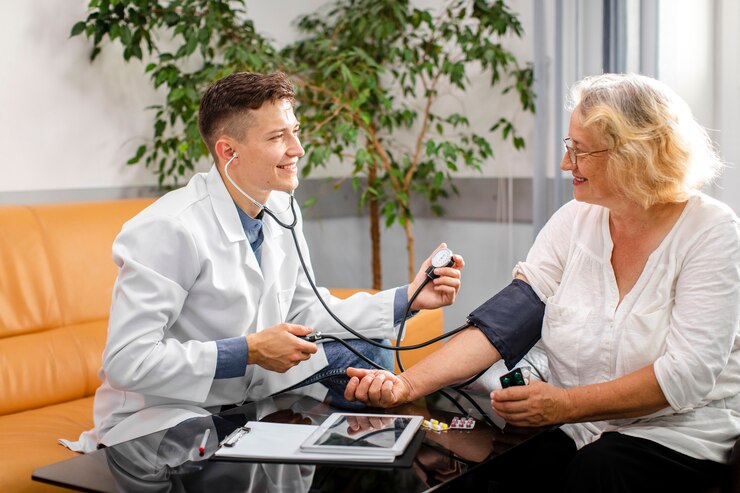Are You Missing the Signs?
Do you ever feel tired, breathless, or have pain in your body and think it’s just stress or getting older? Many adults over 30 are busy with work, family, and daily life. We often ignore small changes in our health. But some small signs can be important, especially for your heart and arteries.
What Are Clogged Arteries?
Your arteries are like highways for your blood. They carry oxygen and nutrients to every part of your body. Over time, fat and cholesterol can build up inside these arteries. This build-up is called plaque. When too much plaque collects, the arteries become narrow or blocked. This is called “clogged arteries” or “atherosclerosis.”
Clogged arteries can lead to heart attacks, strokes, and other serious problems. According to the American Heart Association, heart disease is the number one cause of death in the U.S. (American Heart Association, 2023).

Why Are the Symptoms Silent?
Clogged arteries often do not cause pain at first. They can build up slowly over many years. This is why doctors and the Mayo Clinic call them “silent killers.” You might not notice anything until the problem is serious (Mayo Clinic, 2023).
Silent Symptoms to Watch For
Here are some signs that may mean you have clogged arteries. Pay attention to these, even if they seem small:
- Shortness of Breath:
Do you get out of breath more easily than before? This can happen even when you do simple things, like walking or climbing stairs. - Fatigue:
Feeling tired all the time, even after a good night’s sleep, could be a sign your heart is not getting enough oxygen. - Chest Discomfort:
You might feel pressure, squeezing, or pain in your chest. It can last a few minutes or go away and come back. - Pain in Other Areas:
Sometimes pain appears in your shoulders, arms, neck, jaw, or back, not just your chest. - Leg Pain When Walking:
Pain or cramps in your legs when you walk, but that gets better when you rest, can mean your leg arteries are clogged. - Numbness or Weakness:
Sudden numbness, weakness, or trouble speaking could be a warning sign of a stroke.
Dr. Deepak L. Bhatt from Harvard Medical School says, “Many people don’t know they have heart problems until something serious happens. That’s why it’s important to notice these early signs.” (Harvard Medical School, 2022)

Common Myths and the Real Facts
- Myth: Only old people get clogged arteries.
Fact: Clogged arteries can start at age 30 or even younger, especially if you have high blood pressure, high cholesterol, smoke, or have a family history. (Cleveland Clinic, 2023) - Myth: If I feel fine, my heart must be healthy.
Fact: Many heart problems do not show clear signs until they are advanced. - Myth: Only men need to worry about heart disease.
Fact: Heart disease is the leading cause of death for both men and women in the U.S. (American Heart Association, 2023)
How Can You Protect Your Heart?
You can take simple steps every day to help your heart and arteries:
- Eat Heart-Healthy Foods:
Choose more fruits, vegetables, whole grains, and healthy fats like olive oil. Cut back on fried foods and added sugars. - Stay Active:
Try to move your body every day. Even walking, stretching, or using home exercise tools can help. The Mayo Clinic recommends at least 30 minutes of exercise most days (Mayo Clinic, 2023). - Don’t Smoke:
Smoking damages your arteries. If you need help quitting, talk to your doctor or look for support groups. - Manage Stress:
Use deep breathing, aromatherapy, or gentle exercise to relax. Products like nasal inhalers or calming scents can help lower stress. - Check Your Blood Pressure and Cholesterol:
Get regular checkups. High blood pressure and cholesterol often have no symptoms, but they raise your risk. - Get Enough Sleep:
Aim for 7-8 hours each night. Good sleep helps your heart stay strong.
Dr. Steven Nissen from Cleveland Clinic says, “Small lifestyle changes can make a big difference in protecting your heart.” (Cleveland Clinic, 2023)

Take Action for Your Heart
Do not wait for big symptoms. Listen to your body and take small steps now. Eat well, move more, and manage stress every day. Try adding healthy routines and products, like home exercise, aromatherapy, or nasal inhalers, to your daily life. If you notice any warning signs, talk to your doctor soon.
Your heart works hard for you—give it the care it needs. For more tips and trusted health products, visit our website and start your journey to better heart health today.
References
American Heart Association. (2023). Heart Disease Facts. https://www.heart.org/
Mayo Clinic. (2023). Atherosclerosis. https://www.mayoclinic.org/
Cleveland Clinic. (2023). What Are Clogged Arteries? https://my.clevelandclinic.org/
Bhatt, D.L. (2022). Harvard Medical School. https://hms.harvard.edu/
Nissen, S. (2023). Cleveland Clinic. https://my.clevelandclinic.org/


